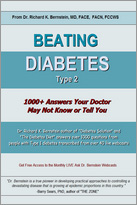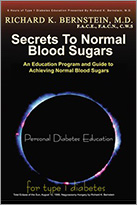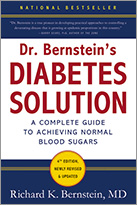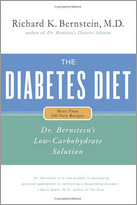It s no exaggeration to say that the Diabetes Diet is a lifesaver. Indeed, I believe I can make a claim that no other diet author can — that my own diet saved my life. I’m not the only one. Patients have raved about the new health and vigor they’ve found by using my diet. There’s a reason why diabetics, the overweight, and the obese have suddenly got control of their lives with this plan: it works.
Six months ago I went to my fiftieth college class reunion. I was one of two people present who were still recognizable from half a century before. The other one plays tennis a couple hours every day. I was the only person in my original class with type 1 diabetes. Unlike most everyone there, I was considerably healthier fifty years after college than during it.
Many of my former classmates sported coronary bypass scars — I’d guess that out of 150 people there, about a third had undergone bypass surgery. Others were obese. Most appeared much older than I. Why them and not me? In college I would never have thought this would be the case. By the time I graduated, I’d been a type 1 diabetic for almost half my life. I already had many complications of the disease. Eventually, seeking to arrest the downward spiral of my health, I came to analyze virtually everything I ate, constantly monitoring the effects on my blood sugars and my health. This is also a claim most diet doctors probably cannot make, and it provides me with an utterly distinct view of how diet affects not only me, but people in general. I would not necessarily wish my particular vantage point on anyone, but it has given me insights that I never would have
had otherwise. The key insight was that what I ate as a young man nearly killed me.
I would surmise that my classmates had mostly not aged well because they had stuck to the conventional wisdom on diet. Who could blame them? If you can’t trust your doctor, whom can you trust?
Yet I can safely say that I am healthier today because I did not trust my doctor, who had told me that what I have accomplished would not be possible. I can also say that I am healthier today not in spite of having a potentially fatal illness, but because of it.
Although I’m now in my seventies, many doctors would mistake my health profile for that of a much younger man. When I was on a very low fat, high-carbohydrate diet more than thirty years ago, I had high fasting triglycerides (usually over 250 mg/dl) and high serum cholesterol (usually over 300 mg/dl), and I developed a number of vascular and other complications. When I went onto a very low carbohydrate diet and did not restrict my fat, my lipids plummeted (lipids are fatty substances in the blood). It’s not an exaggeration to say that through this low-carbohydrate diet plan, I achieved the lipid profile of an Olympic athlete, merely as the result of trying to normalize my blood sugars. That I exercised regularly certainly didn’t hurt my lipid profile — but I was also exercising when my lipid profile was abnormal.
Dare your physician. Ask if the lipid profile of anyone he or she knows on a low-fat diet can remotely compare to what I had achieved on a low-carbohydrate diet with unrestricted fats:
- LDL — the “bad” cholesterol — 63 (below 100 is considered normal)
- HDL — the “good” cholesterol — 116 (above 40 is considered normal)
- Triglycerides — 45 (below 150 is considered normal)
- Lipoprotein(a) — undetectable (below 30 is considered normal)
Contrary to popular myth, fat is not a demon. It’s the body’s way of storing energy and maintaining essential organs such as the brain. Without essential fatty acids your body would cease to function.
It’s an odd twist of fate that I am likely much healthier now than I would have been had I not been a diabetic. The diet is why.
The diet presented in these pages was originally designed as a diabetes diet — and as effective as it has been for countless diabetics, it is much more than just that. Indeed, as more information has become available over the last two decades on the toxic nature of a high-carbohydrate diet, it has never been clearer that the benefits of this diet are nearly as profound for those who do not have diabetes as for those who do.
We see the consequences of the standard American diet, or SAD, all around us: the dramatic public health burden of a society two-thirds of whose members are overweight. Health care costs are soaring, and they will continue to do so, with as many as 20 million Americans suffering from diagnosed and undiagnosed diabetes. There is a desperate race for a cure, when in fact the largest percentage of diabetics could have the same kind of excellent health I have enjoyed if they followed this diet’s prescription.
In my practice I see the very personal consequences of SAD: from the social stigma of obesity to life-threatening issues of heart disease and stroke to sexual dysfunction — the list goes on.
Regardless of whether you are slim or obese, fit or fat, old or young, this diet will promote health and longevity. I recommend following it your whole life, as I now do, in order to enjoy the kinds of benefits I have seen. Even over the short term it can benefit your life and health. Studies have shown that normalizing blood sugars for periods as brief as two weeks can have lasting benefits. So there is every reason to believe that even if you don’t feel that you can stick to it forever — which is, of course, what I recommend — sticking to it for as long as possible can have significant benefits. My belief, however, is that you will be so pleased with the results you won’t want to go back to SAD.
I invite you to be well. I invite you to live long, eat well, and enjoy a healthy, vigorous life.
Author’s Note
This book is not intended as a substitute for professional medical care. The reader should regularly consult a physician for all health-related problems and routine care.




